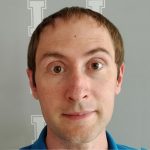Written by: Kelsey Swenson, IIDS Scientific Writing Intern
As two black holes orbit in space, they emit gravitational waves into the universe. These waves carry energy keeping the black holes apart. But as the waves get stronger, the black holes can spiral towards each other and merge into one giant black hole.
In nearby Hanford, Washington in 2015, the first ever gravitational wave was detected by humanity. A LIGO (laser interferometer gravitational wave observatory) detected the waves coming from a colliding pair of black holes 1.3 billion light years away. Indeed, LIGO has unveiled an aspect of the Universe that was previously unseen, and its discoveries resulted in the leaders of LIGO being awarded the 2017 Nobel Prize in Physics.
Zachariah Etienne, a computational astrophysicist and associate professor at the University of Idaho, simulates these colliding black holes using the Falcon supercomputer. These simulations provide the foundation for our understanding of the black holes and how they orbit.
“Gravitational waves from colliding black holes encode critically important information about the black holes, but extracting this information requires comparing the observed waves with millions of theoretical predictions,” he says. “These theoretical predictions are based on simulations of colliding black holes that solve the equations of Einsteinian gravity.”
Falcon provides a fast way for Etienne to perform trial simulations as he prepares the underlying software to release to the public to use on their computers.
Etienne aims to enlist volunteers from around the world to participate in future colliding black hole simulations. To include volunteers, he is working on a project titled BlackHoles@Home that implements new techniques to perform these simulations on desktop computers.
He hopes to gather a huge group of volunteers performing these simulations on their computers that will “help generate the largest and most accurate catalog of theoretical predictions for colliding black hole gravitational waves,” he says.
“The research is quite timely,” he says, “as the LIGO telescopes are about to come online again in the coming months with the greatest sensitivity ever, and future gravitational wave telescopes will only improve on the current state-of-the-art.”

Zachariah Etienne
Associate Professor
Department: Engineering – Physics
Web: https://etienneresearch.com
Email: zetienne@uidaho.edu

